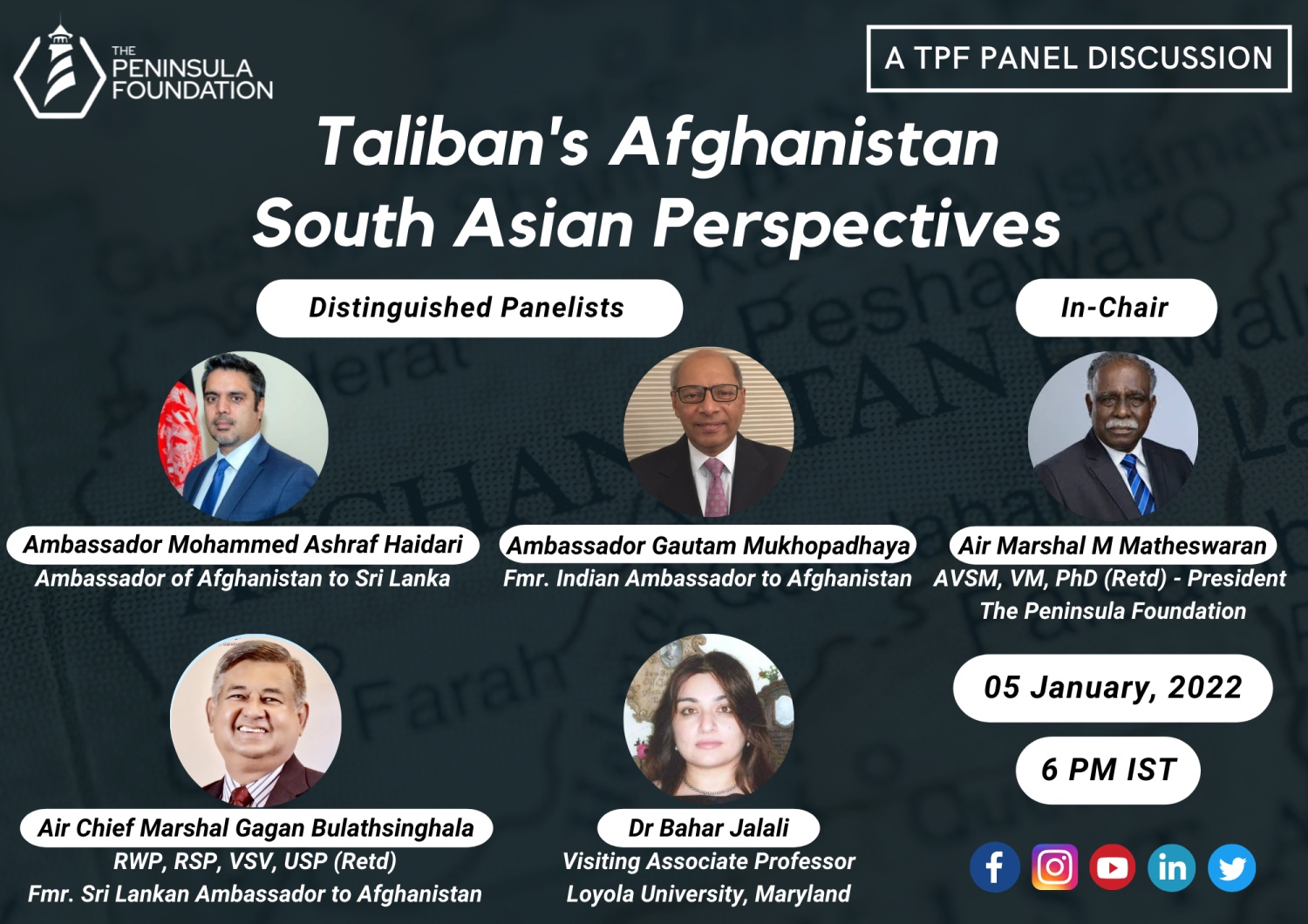
Taliban’s Afghanistan: South Asian Perspectives
A TPF Panel Discussion on “Taliban’s Afghanistan: South Asian Perspectives”.
Concept Note:
“As American and NATO troops made a hasty withdrawal from Afghanistan, Taliban forces swept across and took control of Kabul on August 15, 2021. The new regime, while articulating strict adherence to its version of Sharia, has attempted to build bridges with the rest of the world by indicating a possible moderate face. However, not many have confidence given the Taliban’s religious fundamentalism, its medieval beliefs, and past history of human rights abuse and intolerance. That Pakistan continues to support the Taliban and influence its decisions is well established. Taliban’s Afghanistan faces international isolation and economic crisis. Vast sections of the people are pushed into food and health crisis. Women’s rights and gender equality have become a big question mark. Taliban seems to be getting conditional support from China and Russia. An unstable Afghanistan under the Taliban could reignite factional wars and warlordism, leading to a civil war that could spill over into Central Asia, India’s Kashmir, China’s Xinjiang, and Russia’s Chechnya. Taliban’s close links with Al Qaeda and its cooperation with ISI spells serious concerns for India and the rest of South Asia. The distinguished panellists seek to analyse these issues from a South Asian perspective”.
Event Summary:
The Peninsula Foundation organized a panel discussion on “Taliban’s Afghanistan: South Asian Perspectives” on 05 January, 2022. Air Marshal M Matheswaran AVSM VM PhD (Retd), President of The Peninsula Foundation hosted three distinguished panellists: Ambassador Mohammed Ashraf Haidari, Ambassador of Afghanistan to Sri Lanka, Ambassador Gautam Mukhopadhaya, Former Indian Ambassador to Afghanistan and Air Chief Marshal Gagan Bulathsinghala RWP, RSP, VSV, USP (Retd), Former Sri Lankan Ambassador to Afghanistan.
Ambassador Mohammed Ashraf Haidari was the first speaker in the webinar. He began the discussion with his perspectives on the crisis in Afghanistan and the roles of several states. He termed the Afghan Peace process as a “Withdrawal process.” .”
Ambassador Haidari said, “Our major loss is loss of democracy. Democracy is a deep friend of Afghanistan…India hasn’t done enough. India was expected to take a prominent role in Afghanistan.”
Naming the Indian projects like Salma dam and schools, Ambassador Gautam Mukhopadhaya said Ambassador Haidari’s accusation that India did not do enough, while understandable given the crisis, was only partially true. He articulated, “India was the most favoured nation in an emotional sense. We were able to recover the lost ground. People in India have strong feelings and affinity for the Afghan people. I won’t say that India couldn’t have done more but India’s investment in Afghanistan can’t be compared to any other state including the US. There’s a lot that India is trying to do even now in Afghanistan.”
While speaking on the Taliban, he said, “They (Taliban) have changed in some ways but not in the way they claim. They have become sophisticated in their communication and in the conduct of diplomacy. But there’s no real change in their ideology.
The majority of the people of Afghanistan didn’t have any organic connection with the Taliban. They make deals with every other foreign country, whom they call foreign occupiers. Taliban project is incubated by Pakistan to erase the national identity of Afghanistan and it is in favour of Islamist identity.”
“US made the deal with the Taliban with a hope that they would contain the Al-Qaeda. Russia is engaging with the Taliban to contain Daesh. Chinese did so to contain the ETIM. This is a delusion. You can’t deal with just one terror outfit without dealing with the entire conglomerate. You can’t split them apart,” Ambassador Gautam Mukhopadhaya, who earlier served in Afghanistan as Indian envoy remarked.
“There are still two more delusions. One is that the Taliban will be able to bring stability. There are already differences between the Taliban, between the Taliban and ISIS. There could be an armed resistance or popular resistance. It’s not completely visible yet. There is overwhelming sentiment for freedom. This could come in the shape of a North-South conflict or a Pashtun and non-Pashtun conflict. Taliban will not be able to manage the situation and the instability.
The last delusion is that the Taliban will be able to provide governance. All that the Taliban want is the imposition of Sharia law. The Pakistani project is to drive Afghanistan into the Middle Ages. The Gulf charity hasn’t invested in any Afghan reconstruction project.” he further added.
Air Marshal M Matheswaran, the moderator raised questions on the legitimization of the Taliban and the role of the organizations like SCO and BRICS in Afghanistan. Addressing the moderator, Ambassador Gautam Mukhopadhaya said in response, “SCO is a vehicle of China. China has not acted on larger interest but only on selfish interests.”
Joining in from Colombo, Air Chief Marshal Gagan Bulathsinghala underlined the hunger and humanitarian crisis in Afghanistan, inflation crisis and dissolving of three ministries in Afghanistan.
“We must understand the large displacement crisis. There will be a spill over effect in all the neighbours. The Taliban has strictly imposed restrictions on female workers. That would increase the level of poverty,” Air Chief Marshal Gagan Bulathsinghala asserted. The full video of the webinar session is available on the YouTube page of The Peninsula Foundation.
Image Captions:
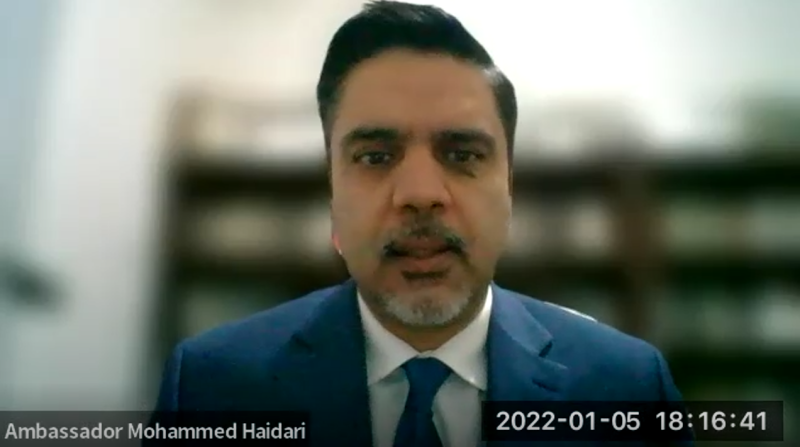
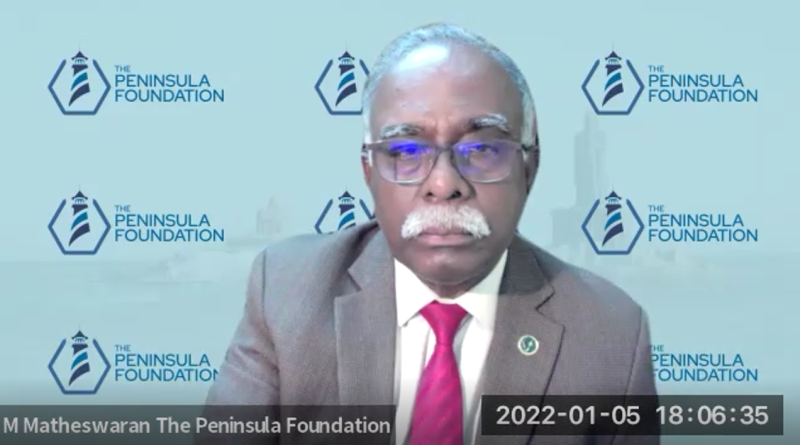
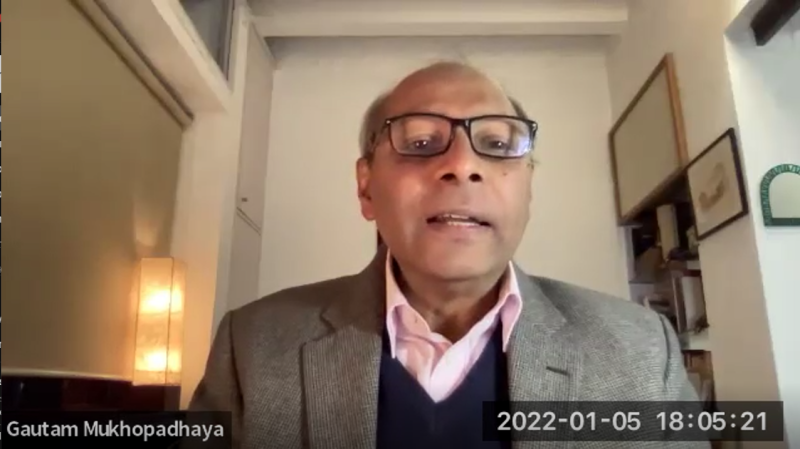
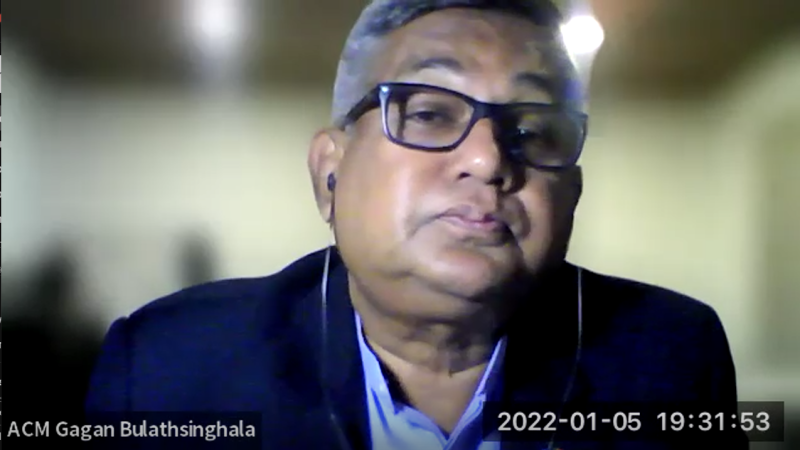
About the Panelists:
Ambassador Mohammed Ashraf Haidari
Ambassador of Afghanistan to Sri Lanka
Ambassador M. Ashraf Haidari is the Afghan envoy to Sri Lanka. Mr. Haidari was the Director-General of Policy and Strategy of the Ministry of Foreign Affairs of Afghanistan from 2015-2018. From 2012-2015, Mr Haidari served as the Deputy Chief of Mission (Minister-Counselor) of Afghanistan to India where he was frequently Chargé d’Affaires A.I. From June 2011 to July 2012, he served as the Deputy Assistant National Security Advisor of Afghanistan. From 2004 to 2011, Mr. Haidari served the Embassy of Afghanistan in the United States in various capacities. From 2001 to 2004, he worked as Assistant to the Vice President for Federal Relations and Assistant Director of Development at Georgetown University in Washington-DC. He is a Senior International Security Fellow at the New American Century in Washington-DC; a Research Fellow at the Afghan Institute for Strategic Studies (AISS) in Kabul; a Visiting Fellow at the Observer Research Foundation (ORF) in New Delhi where he was also a member of the editorial board of the Diplomatist Magazine and a Senior Research Fellow at the Delhi Policy Group (DPG) during 2015-2016. Mr. Haidari is the recipient of many public and academic awards, including the Fredrick J. Urbaska Civic Service Award.
Ambassador Gautam Mukhopadhaya
Former Indian Ambassador to Afghanistan
Ambassador Gautam Mukhopadhaya has served in various capacities in Indian Embassies and Missions in Mexico, Cuba, France, and the United Nations; the Ministry of Defence of India (2002-05); and eventually as India’s Ambassador to Syria (2006-08), Afghanistan (2010-13) and Myanmar (2013-16). He also re-opened the Indian Embassy in Kabul in November 2001 as Charge d’Affaires after the ouster of the Taliban in Afghanistan in November 2001. Ambassador Mukhopadhaya is currently affiliated with the NITI Aayog’s ‘NITI Forum for the North East as an Advisor, and Chair of a CII Task Force on economic ties with Cambodia, Laos, Myanmar and Vietnam (CLMV countries) and has a senior visiting fellow at the Centre for Policy Research. Ambassador Mukhopadhaya’s diplomatic career has been notable for the range of his professional experience covering media, culture, human rights, development, defence and security issues. He is an alumnus of the National Defence College of India (2001) and has also worked at the UN Headquarters in New York as a Consultant on Social Development (September 1999-August 2000) and as a Visiting Fellow at the Carnegie Endowment for International Peace in Washington DC, (October 2009-March 2010).
Air Chief Marshal Gagan Bulathsinghala RWP, RSP, VSV, USP (Retd)
Former Sri Lankan Ambassador to Afghanistan
Air Chief Marshal Gagan Bulathsinghala RWP, RSP, VSV, USP is a retired air officer and a former Commander of the Sri Lanka Air Force. He has also held the position of Chief of the Air Staff and, after his retirement on 12 September 2016, was appointed the Sri Lankan Ambassador to Afghanistan. Air Marshal Gagan is a graduate of Air Command and Staff College at Air University (the United States Air Force), Alabama, USA and the prestigious National Defence College (India), New Delhi. He also holds a Post graduate degree of Master of Philosophy in Defence and Strategic Studies from the University of Madras, India, and a Master of Science in Defence Studies Management from General Sir John Kotelawala Defence University, Sri Lanka. Gagan is also a Fellow of Asia-Pacific Center for Security Studies, Hawaii and Near East South Asia Center for Strategic Studies USA. He has served in various staff appointments at Air Force Headquarters during his career. He was appointed to the Air Force Board of Management as the Director of Operations in the year 2011 and thereafter as the Director of Air Operations in the year 2012. He was subsequently appointed as the Chief of Staff in the year 2014. He was elevated to the rank of Air Marshal on 01st June 2015 and was appointed as the Commander of the Sri Lanka Air Force on 16th June 2015.
Dr Bahar Jalali
Visiting Associate Professor, Loyola University, Maryland
Dr. Bahar Jalali teaches the history of the Modern Middle East. Her area of expertise is Afghanistan. She focuses on modernization and women’s rights in the twentieth century under the Old Regime. She is currently finishing a manuscript on the Decade of Democracy from 1963-1973 in Afghanistan when an urban educated intelligentsia spearheaded democratic reforms and a liberal Constitution. Born in Afghanistan, she fled the country as a child after the Soviet invasion. In 2009, she returned to Afghanistan to work at the newly opened American University in Kabul where she taught History of Afghanistan and founded the first Gender Studies program in the history of the country. She recently started an online protest campaign calling for the protection of women’s rights and the preservation of cultural heritage in Afghanistan. This campaign has received extensive coverage in the international press. It has also triggered wide-ranging discussions on the protection of human rights and cultural heritage in Afghanistan under the Taliban regime.
Moderator:
Air Marshal M Matheswaran AVSM VM PhD (Retd)
President, The Peninsula Foundation
Air Marshal M Matheswaran is an Indian Air Force veteran with 39 years of active service. He is the founder- President of The Peninsula Foundation. He is the former Deputy Chief of Integrated Defence Staff responsible for Policy, Plans, and Force Development. The Air Marshal is a recipient of Presidential Awards – AVSM (Ati Vishisht Seva Medal) and VM (Vayu Sena Medal) and a Commendation by the Chief of Air Staff. He has a PhD from the University of Madras, Chennai, is an alumni of the National Defence College, New Delhi and is a Senior Fellow in International and National Security from the Harvard Kennedy School.
Event Brochure – Taliban’s Afghanistan: South Asian Perspectives
Hourly Schedule
Program Schedule
- 06:00 PM - 06:05 PM IST
- Welcome Address
- 06:05 PM - 06:12 PM IST
- Introductory Remarks by the Chair
- Air Marshal M Matheswaran AVSM VM PhD (Retd), President - The Peninsula Foundation
- 06:12 PM - 07:00 PM IST
- Panel Discussion
- Taliban's Afghanistan: South Asian Perspectives
- 07:00 PM - 07:20 PM IST
- Q & A
- 07:20 PM - 07:28 PM IST
- Concluding Remarks
- 07:28 PM - 07:30 PM IST
- Vote of Thanks
